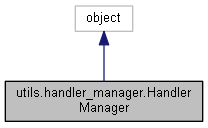|
Baby Language Lab Scripts
A collection of data processing tools.
|
|
Baby Language Lab Scripts
A collection of data processing tools.
|
This class is a data structure that stores information about handler methods for UI widgets. More...

Public Member Functions | |
| def | __init__ |
| Constructor. More... | |
| def | add_handler |
| Adds a handler (for a particular widget) to this instance. More... | |
| def | get_handler_id |
| Retrieves a handler id (number used by GTK+ to identify a handler) for a given UI object and signal. More... | |
| def | block_handler |
| Temporarily prevents a specified signal from invoking handlers, for a given UI widget. More... | |
| def | unblock_handler |
| Unblocks a signal that has been blocked with block_handler(). More... | |
| def | remove_handlers |
| Disconnects handler methods from a widget, and removes all record of the handler from this instance. More... | |
Public Attributes | |
| conn_dict | |
Private Member Functions | |
| def | _have_handler |
| Internal method to check if a particular handler (for a particular widget) is already stored in this instance. More... | |
This class is a data structure that stores information about handler methods for UI widgets.
Handler methods are called when a UI widget generates an event, such as a button click. The main benefit of using this class is that it provides a lookup mechansim. You can lookup handlers for a particular widget based on a specified type of signal (event). Plain PyGTK does not provide a straightforward way to do this. Another benefit is that if we have a centralized data structure for all handlers in a form, we don't have to pass around lots of handler ids or function pointers when we want to do things like temporarily block a handler for a particular widget. Instead, you can just call the block_handler() / unblock_handler() methods for a particular widget and signal.
Definition at line 11 of file handler_manager.py.
| def utils.handler_manager.HandlerManager.__init__ | ( | self | ) |
|
private |
Internal method to check if a particular handler (for a particular widget) is already stored in this instance.
| self | |
| obj | (UI object) a UI widget object |
| sig | (string) a GTK+ event string (like 'clicked' or 'destroy' - see PyGTK docs for a list for your desired widget) |
Definition at line 22 of file handler_manager.py.
| def utils.handler_manager.HandlerManager.add_handler | ( | self, | |
| obj, | |||
| sig, | |||
| fcn, | |||
data = None |
|||
| ) |
Adds a handler (for a particular widget) to this instance.
| self | |
| obj | (UI object) the UI widget object for which we are adding a handler |
| sig | (string) a GTK+ event string (like 'clicked' or 'destroy' - see PyGTK docs for a list for your desired widget) |
| fcn | (function pointer) the function that the signal will invoke |
| data | (object=None) optional extra data to pass to the function when it is invoked (see pyGTK signal tutorials to learn more about this) |
Definition at line 31 of file handler_manager.py.
| def utils.handler_manager.HandlerManager.block_handler | ( | self, | |
| obj, | |||
| sig | |||
| ) |
Temporarily prevents a specified signal from invoking handlers, for a given UI widget.
This does not remove the handler from this instance, nor does it disconnect the handler from the widget object. The signal will be blocked for this widget until unblock_handler() is called (see below).
| self | |
| obj | (UI object) the UI widget on which to block a handler |
| sig | (string) a GTK+ event string (eg. 'clicked') indicating the signal to block |
Definition at line 58 of file handler_manager.py.
| def utils.handler_manager.HandlerManager.get_handler_id | ( | self, | |
| obj, | |||
| sig | |||
| ) |
Retrieves a handler id (number used by GTK+ to identify a handler) for a given UI object and signal.
| self | |
| obj | (UI object) the UI widget object to lookup |
| sig | (string) a GTK+ event string (eg. 'clicked') indicating the signal to look for handlers for |
Definition at line 45 of file handler_manager.py.
| def utils.handler_manager.HandlerManager.remove_handlers | ( | self, | |
| obj, | |||
sigs = None |
|||
| ) |
Disconnects handler methods from a widget, and removes all record of the handler from this instance.
| self | |
| obj | (UI object) the UI object whose handler we are disconnecting |
| sigs | (list=None) list of GTK+ event strings (eg. ['clicked']) indicating the signals to remove handlers for. Pass None to remove all handlers for all signals for the widget. |
Definition at line 74 of file handler_manager.py.
| def utils.handler_manager.HandlerManager.unblock_handler | ( | self, | |
| obj, | |||
| sig | |||
| ) |
Unblocks a signal that has been blocked with block_handler().
| self | |
| obj | (UI object) the UI widget on which to unblock signal handlers. |
| sig | (string) a GTK+ event string (eg. 'clicked') indicating the signal to unblock. |
Definition at line 66 of file handler_manager.py.
| utils.handler_manager.HandlerManager.conn_dict |
Definition at line 15 of file handler_manager.py.